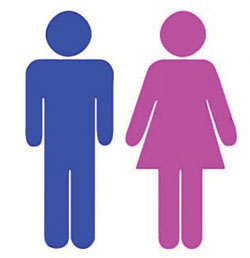So the cat is out of the bag. The MTV hit show, “Guy Code” has revealed every male secret… or have they? The show examines multiple facets of the lifestyle for a mid-20s male college student but how true are these stereotypes in relationship to MU students? Take a second and think. How do you associate college males at the University when it comes to relationships and love, sports, or how they spend their money? These three topics will be looked at and classic stereotypes will be confirmed or will be removed from “the code.”
Johanna Foster, instructor of sociology, believes that there is too much weight put on certain aspects of a male’s lifestyle. “On top of that underlying taboo in the culture of hegemonic masculinity is the overvaluing of wealth, power and prestige as primary signs of appropriate manhood, and the willingness to use, or at least unequivocally support, the use of aggression and violence in order to achieve those culturally prescribed goals,” she said.
1.) Relationships
Relationships are difficult for anyone, but college men are portrayed as solely partyers and are expected to be having sex with as many people as possible, according to Dr. Deanna Shoemaker, associate professor of communication. But as Dr. Jack Demarest, professor of psychology at the University, said it is more about competition when it comes to relationships, which may be why college men are shown as to only view women as sexual objects.
“Mothers tell their daughters to find a lawyer or a doctor to marry; they never brag that their daughter is dating a garbage man. Boys and men may objectify girls as sex objects, but girls and women objectify boys as status and success objects. The winds that govern same sex friendships, romance and career choices, like sports, are formed initially by competition between guys but they blow most forcefully by this competition between the sexes,” said Demarest.
Samuel Maynard, junior political science major, believes that there are no real “differences” when it comes to each gender and their relationships, but it is used as a topic of exploitation by certain media outlets.
“There is no inherent difference in the way men and women deal with relationships, only socialized myths that are projected on individuals in our highly stratified and misogynistic society,” said Maynard.
Maynard also said that these roles that have been placed on relationships seek only to keep male dominance in relationships.
2.) Sports
Some men treat Super Bowl Sunday as the second coming of Christ. Some men wait all year for their company’s softball league to start up again. So what appeals to men about sports?
Sophomore political science major Dominick Mascitelli said that men view sports as an opportunity to bond more than anything else. Mascitelli explained, “It’s the epitome of competition between teams, and bragging rights and possibly money if bets have been placed. Throwing around a football bonds friend together in a way that’s inexplicable.”
Demarest explains that men are very competitive in general, not just with sports. “As we age, we find that sports provide an opportunity to bond with other boys/ guys even as we also learn not to get too close or express too much of our emotions (with the exception of anger/aggression) among other guys,” said Demarest.
Mascitelli said that he believes there are three rules to participating in sports. “You got to heckle your friends if his team is losing, in good taste. Know your facts/ stats when debates come up and keep it friendly, don’t make things personal,” said Mascitelli.
Maynard believes that men and sports are another stereotype that may not be necessarily true. “Men act this way because society says they should in order to exercise privilege,” he said.
Ryan Kinghorn, sophomore health and physical education major, said that men are not the only ones who get into sports. “I know some girls who are die hard [fans] that will be yelling at the television more than I will at times during the game,” said Kinghorn.
3.) Money
Money seems to be an object that no one, men or women, seem to have enough of these days, especially with the state of the economy. So what do men spend their money on?
Demarest said that men are often judged on what they earn and how financially secure they are. “Girls are taught they have economic choices, boys are taught they have financial obligations. Consciously or unconsciously, we learn that we are evaluated by society and, especially, by desirable females as interchangeable ‘success objects,’” said Demarest.
Even though “Guy Code” can be fun, it can also be dangerous. Shoemaker warns about the possible negative effects, some of which are encouraging sexual assault of women, alcohol poisoning, intense social pressure around sports, bullying, among others.
“While ‘Guy Code’ uses very talented comedians to poke fun at gender stereotypes, the show may also unintentionally reinforce stereotypes that don’t serve young men well,” said Shoemaker.
Shoemaker offers her advice to college-aged men of her own. “One: work to resist and break harmful gender stereotypes with critical thinking and by speaking out against harmful stereotypes that demean people. Two: respect young women (and all women) as equals and don’t reduce them to sexual objects (i.e. don’t confuse “sexy” with “sexual object”). Three: respect yourself and figure out who you really aspire to be as a man in spite of what popular culture tells you.”
Linda Dinella, assistant professor of psychology, said that each person needs to be treated as an individual, not as a social group. “Men and women are more similar than they are different. We need to respect each person as an individual and not try to force them into an ill-fitting category,” said Dinella.
Demarest agreed that the “code” is more for acceptance than an actual guide. “‘Guy Code’ is just code for how to adapt, fit in, and avoid conflict. It is a set of rules for men and boys when bending the rules is risky and does not get you very far.”
Demarest said that in a changing world, these codes seem to maintain the status quo.
“It stresses and reinforces the very stereotypical limitations that our society has valued for millennia for men and for women,” he said. “It is easier to live our lives in a way that does not rock the boat.”




